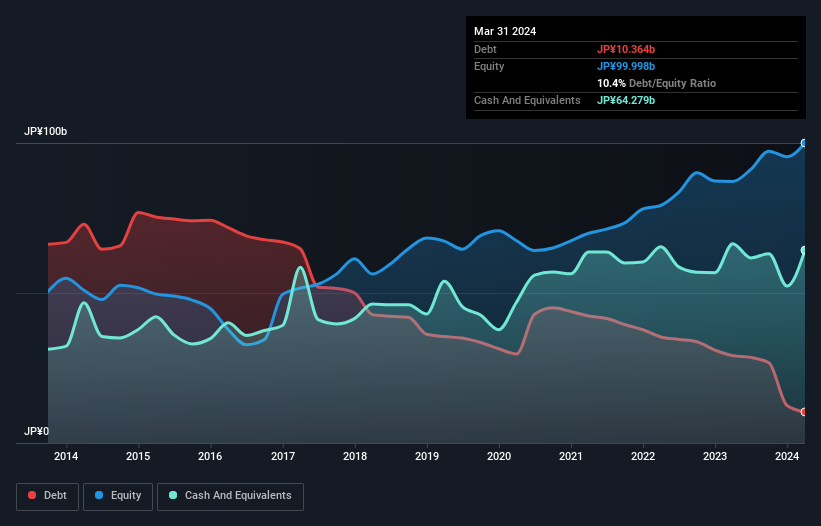Legendary fund manager Li Lu (who Charlie Munger backed) once said, 'The biggest investment risk is not the volatility of prices, but whether you will suffer a permanent loss of capital.' So it might be obvious that you need to consider debt, when you think about how risky any given stock is, because too much debt can sink a company. Importantly, TOMY Company, Ltd. (TSE:7867) does carry debt. But is this debt a concern to shareholders?
When Is Debt A Problem?
Debt and other liabilities become risky for a business when it cannot easily fulfill those obligations, either with free cash flow or by raising capital at an attractive price. In the worst case scenario, a company can go bankrupt if it cannot pay its creditors. While that is not too common, we often do see indebted companies permanently diluting shareholders because lenders force them to raise capital at a distressed price. Of course, plenty of companies use debt to fund growth, without any negative consequences. The first thing to do when considering how much debt a business uses is to look at its cash and debt together.
View our latest analysis for TOMY Company
How Much Debt Does TOMY Company Carry?
You can click the graphic below for the historical numbers, but it shows that TOMY Company had JP¥10.4b of debt in March 2024, down from JP¥29.1b, one year before. But it also has JP¥64.3b in cash to offset that, meaning it has JP¥53.9b net cash.

A Look At TOMY Company's Liabilities
The latest balance sheet data shows that TOMY Company had liabilities of JP¥53.7b due within a year, and liabilities of JP¥12.5b falling due after that. Offsetting these obligations, it had cash of JP¥64.3b as well as receivables valued at JP¥25.0b due within 12 months. So it can boast JP¥23.1b more liquid assets than total liabilities.
This short term liquidity is a sign that TOMY Company could probably pay off its debt with ease, as its balance sheet is far from stretched. Succinctly put, TOMY Company boasts net cash, so it's fair to say it does not have a heavy debt load!
On top of that, TOMY Company grew its EBIT by 43% over the last twelve months, and that growth will make it easier to handle its debt. When analysing debt levels, the balance sheet is the obvious place to start. But it is future earnings, more than anything, that will determine TOMY Company's ability to maintain a healthy balance sheet going forward. So if you're focused on the future you can check out this free report showing analyst profit forecasts.
Finally, while the tax-man may adore accounting profits, lenders only accept cold hard cash. TOMY Company may have net cash on the balance sheet, but it is still interesting to look at how well the business converts its earnings before interest and tax (EBIT) to free cash flow, because that will influence both its need for, and its capacity to manage debt. Over the last three years, TOMY Company actually produced more free cash flow than EBIT. There's nothing better than incoming cash when it comes to staying in your lenders' good graces.
Summing Up
While it is always sensible to investigate a company's debt, in this case TOMY Company has JP¥53.9b in net cash and a decent-looking balance sheet. And it impressed us with free cash flow of JP¥25b, being 113% of its EBIT. So we don't think TOMY Company's use of debt is risky. Over time, share prices tend to follow earnings per share, so if you're interested in TOMY Company, you may well want to click here to check an interactive graph of its earnings per share history.
If you're interested in investing in businesses that can grow profits without the burden of debt, then check out this free list of growing businesses that have net cash on the balance sheet.
Valuation is complex, but we're here to simplify it.
Discover if TOMY Company might be undervalued or overvalued with our detailed analysis, featuring fair value estimates, potential risks, dividends, insider trades, and its financial condition.
Access Free AnalysisHave feedback on this article? Concerned about the content? Get in touch with us directly. Alternatively, email editorial-team (at) simplywallst.com.
This article by Simply Wall St is general in nature. We provide commentary based on historical data and analyst forecasts only using an unbiased methodology and our articles are not intended to be financial advice. It does not constitute a recommendation to buy or sell any stock, and does not take account of your objectives, or your financial situation. We aim to bring you long-term focused analysis driven by fundamental data. Note that our analysis may not factor in the latest price-sensitive company announcements or qualitative material. Simply Wall St has no position in any stocks mentioned.
Have feedback on this article? Concerned about the content? Get in touch with us directly. Alternatively, email editorial-team@simplywallst.com
About TSE:7867
TOMY Company
Plans, manufactures, and sells toys, general merchandise, card games, and baby care products.
Flawless balance sheet with solid track record and pays a dividend.
Similar Companies
Market Insights
Community Narratives





